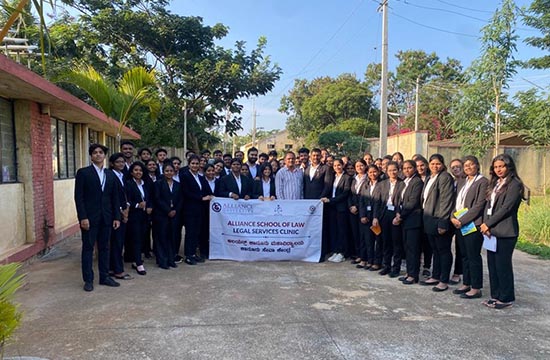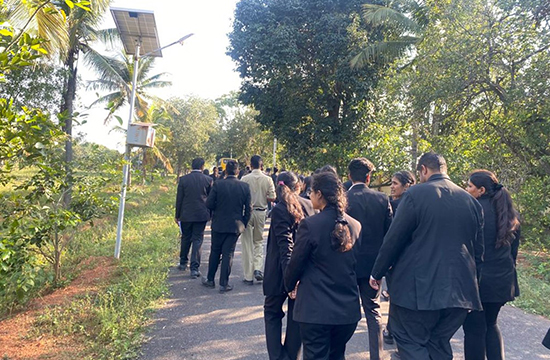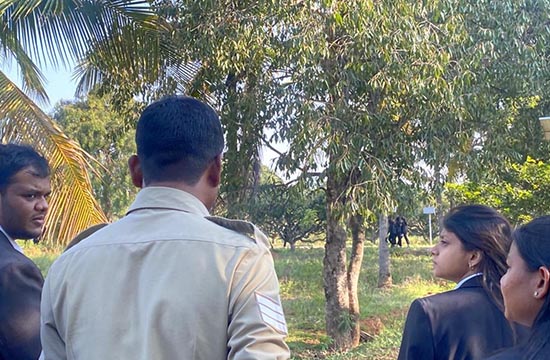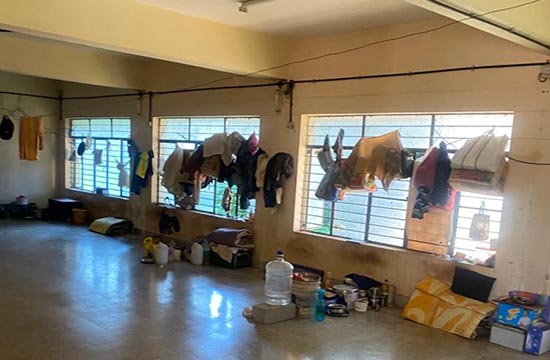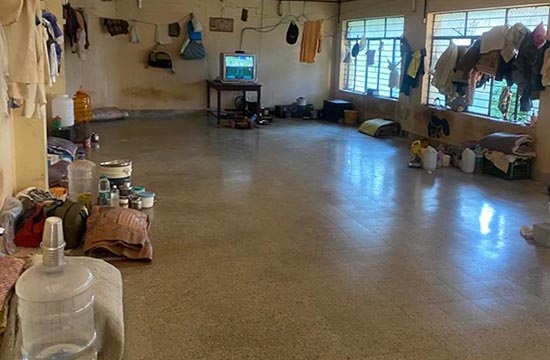Extension/ Outreach Activities [ View All ]
Visit to Open Air Prison and Rehabilitation Centre in Bengaluru
13 October, 2023A qualitative and a quantitative study was undertaken by a group of students at Alliance School of law, Alliance University, Bangalore. The students at Alliance University Legal Services Clinic (AULSC) had been to the only Open-Air Prison and Rehabilitation Centre in Bengaluru on 13.10.2023 and interacted with the head of the open-air jail who was very much keen on answering all the question arising out of our curious minds. This study is done by AULSC members with a basic intention that, in this society there always prevails a notion of criminals being bad and when left back to the society after their tenure being served as prisoners to be a negative influence to the society, we being the future lawyers wanted to change this notion essentially by changing our own prejudice regarding to that and it could’ve, only been possible by an interaction with the prison authorities and the inmates.
The criminal justice system exhibits a comprehensive approach to handling various stages of the legal process, from police investigation to rehabilitation in an open-air prison. In this system, police initiate investigations, deciding whether cases are bailable or not. When non-bailable, the judiciary determines bail and custody, when in custody it becomes the prisons responsibility to ensure legal representation for economically disadvantaged accused individuals. This commitment to legal aid through the Legal Services further underlines the state's dedication to justice. Once imprisoned, undertrial prisoners receive psychological counselling, addressing their needs beyond mere confinement. If acquitted, they are reintegrated into society, while convicted individuals may appeal with legal support. The role of the jailor becomes paramount in guiding and reforming inmates during their sentence, emphasizing rehabilitation and the creation of crime-free society ambassadors.
The open-air prison, a unique feature of Karnataka's correctional system, promotes trust and skill development among prisoners, granting them opportunities for work and remission. It primarily houses convict for serious offenses like murder and attempts, excluding more dangerous criminals and habitual offenders. This system's compassion, coupled with the opportunity for reform, offers a holistic model of criminal justice that aims to not only punish but also rehabilitate individuals, setting an example in the state's legal landscape.
During the visit to the open-air prison in Bengaluru, we had the opportunity to witness a unique and innovative approach to imprisonment that places a strong emphasis on rehabilitation and productive activities for all the 42 inmates. Upon entering the prison premises, it became evident that many of the inmates had developed valuable skills during the sentencing here. Some prisoners were engaged in cooking, while others were involved in herding animals and agriculture. This diversity of skills highlighted the prison's philosophy of providing inmates with opportunities to develop expertise and contribute positively to society. We were taken to the barracks where the prisoners reside, and we learned that each barrack, houses approximately 9 to 12 inmates. What sets this open-air prison apart is the concept of work and remuneration. The government funds the wages for the inmates' labour, but this system also encourages a sense of responsibility and reciprocity. Inmates are required to contribute something in return for the financial support they receive.
The work assignments for the inmates are determined by the prison authorities, following prescribed rules and guidelines. In this unique facility, various products like dairy and mutton are produced and sold through an association at government-determined prices. This not only provides the inmates with practical work experience but also enables them to contribute to their own betterment and sustainability of the prison operations. The system's underlying principle is to instil a sense of responsibility, discipline, and work ethics in the inmates, which can be valuable skills for their reintegration into society once they complete their sentences. It also fosters a sense of self-worth and accomplishment among the prisoners, as they actively participate in the production and sale of goods.
Furthermore, the inmates have the opportunity to earn remissions for good behaviour, which can shorten their sentences and serve as an incentive for them to reform. The prison authorities hold the power to grant these remissions based on the inmates' conduct and willingness to engage in the work programs provided.
By this visit to the open-air jail, it would be really important to say that once a crime is done it is not long for a convict to change himself for the greater good, mistakes happen and here such mistakes are used as a medium to rectify and rehabilitate the convict and sending him back to the society. Hence, this project has indeed sensitized our own students regarding the convicts and how they are being rehabilitated, while interacting with the head of open-air jail he said that “this place isn’t a jail for the prisoners but a prisoners ashram” which indeed states how a convict is corrected here and is integrated to the society.
The visit to the open-air jail emphasized that a criminal past need not define one's future. Mistakes are seen as opportunities for growth and rehabilitation. This project has sensitized students to the remarkable transformation occurring within the prison. As the head of the open-air jail aptly stated, "This place is not a jail for the prisoners but a prisoners ashram." This phrase underscores the focus on correction and reintegration, emphasizing that inmates are being prepared for a positive return to society.

